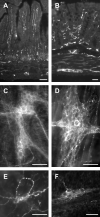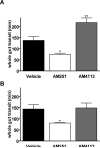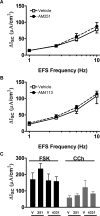Differential effects of CB(1) neutral antagonists and inverse agonists on gastrointestinal motility in mice
- PMID: 20180825
- PMCID: PMC2943391
- DOI: 10.1111/j.1365-2982.2010.01478.x
Differential effects of CB(1) neutral antagonists and inverse agonists on gastrointestinal motility in mice
Abstract
Background: Cannabinoid type 1 (CB(1)) receptors are involved in the regulation of gastrointestinal (GI) motility and secretion. Our aim was to characterize the roles of the CB(1) receptor on GI motility and secretion in vitro and in vivo by using different classes of CB(1) receptor antagonists.
Methods: Immunohistochemistry was used to examine the localization of CB(1) receptor in the mouse ileum and colon. Organ bath experiments on mouse ileum and in vivo motility testing comprising upper GI transit, colonic expulsion, and whole gut transit were performed to characterize the effects of the inverse agonist/antagonist AM251 and the neutral antagonist AM4113. As a marker of secretory function we measured short circuit current in vitro using Ussing chambers and stool fluid content in vivo in mouse colon. We also assessed colonic epithelial permeability in vitro using FITC-labeled inulin.
Key results: In vivo, the inverse agonist AM251 increased upper GI transit and whole gut transit, but it had no effect on colonic expulsion. By contrast, the neutral antagonist AM4113 increased upper GI transit, but unexpectedly reduced both colonic expulsion and whole gut transit at high, but not lower doses.
Conclusions & inferences: Cannabinoid type 1 receptors regulate small intestinal and colonic motility, but not GI secretion under physiological conditions. Cannabinoid type 1 inverse agonists and CB(1) neutral antagonists have different effects on intestinal motility. The ability of the neutral antagonist not to affect whole gut transit may be important for the future development of CB(1) receptor antagonists as therapeutic agents.
Figures






References
-
- Massa F, Storr M, Lutz B. The endocannabinoid system in the physiology and pathophysiology of the gastrointestinal tract. J Mol Med. 2005;83:944–954. - PubMed
-
- Izzo AA, Camilleri M. Emerging role of cannabinoids in gastrointestinal and liver diseases: basic and clinical aspects. Gut. 2008;57:1140–1155. - PubMed
-
- Izzo AA, Mascolo N, Capasso F. The gastrointestinal pharmacology of cannabinoids. Curr Opin Pharmacol. 2001;1:597–603. - PubMed
-
- Coutts AA, Izzo AA. The gastrointestinal pharmacology of cannabinoids: an update. Current Opinion in Pharmacology. 2004;4:572–579. - PubMed
-
- Li YY, Li YN, Ni JB, Chen CJ, Lv S, Wu RH, Yuece B, Storr M. Involvement of cannabinoid-1 and cannabinoid-2 receptors in septic ileus. Neurogastroenterol Motil. 2009 in press. - PubMed
Publication types
MeSH terms
Substances
Grants and funding
- CAPMC/ CIHR/Canada
- DA023142/DA/NIDA NIH HHS/United States
- R01 DA007215/DA/NIDA NIH HHS/United States
- R01 DA011322/DA/NIDA NIH HHS/United States
- DA7215/DA/NIDA NIH HHS/United States
- R37 DA003801/DA/NIDA NIH HHS/United States
- DA3801/DA/NIDA NIH HHS/United States
- R37 DA023142/DA/NIDA NIH HHS/United States
- DA21696/DA/NIDA NIH HHS/United States
- R01 DA003801/DA/NIDA NIH HHS/United States
- P01 DA009158/DA/NIDA NIH HHS/United States
- DA11322/DA/NIDA NIH HHS/United States
- K05 DA021696/DA/NIDA NIH HHS/United States
- DA09158/DA/NIDA NIH HHS/United States
LinkOut - more resources
Full Text Sources
Other Literature Sources
Research Materials

